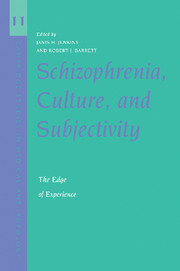Book contents
- Frontmatter
- Contents
- Contributors
- Preface
- Acknowledgments
- Schizophrenia, Culture, and Subjectivity
- Introduction
- Part 1 Culture, Self, and Experience
- Part 2 Four Approaches for Investigating the Experience of Schizophrenia
- 6 Experiences of Psychosis in Javanese Culture: Reflections on a Case of Acute, Recurrent Psychosis in Contemporary Yogyakarta, Indonesia
- 7 To “Speak Beautifully” in Bangladesh: Subjectivity as Pāgalāmi
- 8 Innovative Care for the Homeless Mentally Ill in Bogota, Colombia
- 9 Symptoms of Colonialism: Content and Context of Delusion in Southwest Nigeria, 1945–1960
- Part 3 Subjectivity and Emotion
- Index
- References
7 - To “Speak Beautifully” in Bangladesh: Subjectivity as Pāgalāmi
Published online by Cambridge University Press: 25 January 2010
- Frontmatter
- Contents
- Contributors
- Preface
- Acknowledgments
- Schizophrenia, Culture, and Subjectivity
- Introduction
- Part 1 Culture, Self, and Experience
- Part 2 Four Approaches for Investigating the Experience of Schizophrenia
- 6 Experiences of Psychosis in Javanese Culture: Reflections on a Case of Acute, Recurrent Psychosis in Contemporary Yogyakarta, Indonesia
- 7 To “Speak Beautifully” in Bangladesh: Subjectivity as Pāgalāmi
- 8 Innovative Care for the Homeless Mentally Ill in Bogota, Colombia
- 9 Symptoms of Colonialism: Content and Context of Delusion in Southwest Nigeria, 1945–1960
- Part 3 Subjectivity and Emotion
- Index
- References
Summary
Introduction
This chapter demonstrates that what Bangladeshis call pāgalāmi, madness, is shaped by metacommunicative pressures and cultural sensibilities touching gender and the aesthetics of behavior and experience. My analysis, inspired by linguistic anthropology, uncovers one aspect of the relationship between Bengali culture, language, and interactive style. I analyze a transcript of videotaped conversation with a person with schizophrenia to focus on speech as contextually embedded interaction rather than simply a manifestation of individual psyche. I focus on conversational turn taking and breakdowns therein to uncover a Bangladeshi family's embodied sense of beauty in interaction. Videotape reveals uses of the body in gesture and postural orientation. Through their bodily and verbal acts, we can witness Bangladeshis struggling to achieve or maintain intersubjectivity, enacting local gender sensibilities, and responses to modernity.
Schizophrenia and Pāgalāmi: Dual Perspectives on Bangladeshi Cases
I focus my analysis on a woman I call Rani, about twenty years old at the time her encounter with madness began, whom I met in the course of doing anthropological fieldwork in Bangladesh. I describe her case in the context of families and villages, which is where the realities of Bangladeshi pāgalāmi, or madness, are still largely constructed, rather than in the framework of medicine, psychiatry, and mental institutions. In relation to Rani's case and a number of others, I had the advantage of collaborating with Dr. Chowdhury, a practicing Bangladeshi psychiatrist, who was trained in the United Kingdom and who diagnosed these cases as fulfilling the ICD criteria for schizophrenia.
- Type
- Chapter
- Information
- Schizophrenia, Culture, and SubjectivityThe Edge of Experience, pp. 196 - 218Publisher: Cambridge University PressPrint publication year: 2003
References
- 2
- Cited by



